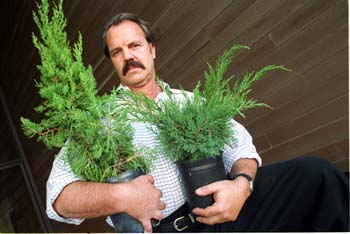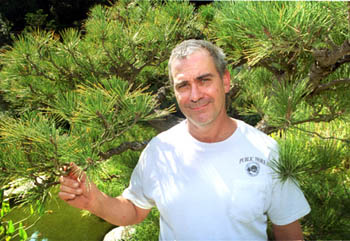![[Metroactive Features]](/features/gifs/feat468.gif)
[ Features Index | San Jose | Metroactive Central | Archives ]
 Photograph by George Sakkestad Safer Sex: Author Tom Ogren says the solution to the allergy crisis lies in females of the plant species--even if it means sex changes for the boys. Pollen Nation Master gardener and author Tom Ogren says that the modern landscaping preference for male plants has created an abundance of pollen and an allergy crisis of catastrophic proportions By Mary Spicuzza THEY SPREAD THEIR SEED everywhere. They bully females of the species by winning favor with city planners as the superior, lower-maintenance sex. And now, according to author Tom Ogren, male plants have created a nationwide health crisis with their chauvinist domination of the landscape. Ogren, a San Luis Obispo-based writer and author of the recently released book Allergy-Free Gardening (Ten Speed Press), normally speaks with a laid-back, California "It's all good" composure. But just ask him about modern landscapers' love affair with planting male plants and trees, and he is quickly seething with resentment at the unfair and dangerous mistreatment doled out to females of the plant kingdom. In September, Ogren spoke at a UC-Santa Cruz Extension workshop co-sponsored by the Master Gardeners of Santa Clara. He hopes to bring to Silicon Valley his message that the allergy explosion takes root with landscapers growing insensitive to the need for balance among males and females in the plant world. Ogren believes males create more pollen while females clean up the mess by serving as natural air filters. But because females produce fruit, seen as messy, high-maintenance rattraps, they have fallen out of favor among busy city planners looking to create "litter-free" streetscapes. Fewer female trees may mean cleaner streets and fewer rats hoping to make off with fruits and nuts. After 15 years of research, Ogren insists that this new patriarchy of the plant kingdom is the root of modern allergy woes, sending pollen counts skyrocketing. And human attempts to control the environment have sent health problems spiraling out of control. "We have these extremely manipulated streetscapes," Ogren says. "What these actually are, of course, are male clones. As males, their job is to produce pollen, and that they do. Even though in many cities we have less total vegetation than we used to, we have more pollen in our air now than ever before."
Stuffed-Up Shirts: Why Silicon Valley is filled with so many sneezing and wheezing souls.
The Politics of Pollen HEALTHY HORTICULTURIST Ogren admits that he too was once an allergy skeptic. Even though his wife, mother and sisters all suffer from severe allergies, he suspected they were actually struggling with psychosomatic illnesses until 15 years ago. It was then that Ogren, who has a master's degree in agricultural horticulture, drove to Berkeley to work on a landscaping project. "I remember specifically that the acacias were in bloom, because I drove along the highway thinking it was the most beautiful sight I'd ever seen," Ogren says. "But then I got to Berkeley, and everybody was sick. It seemed like each person I met in the entire Bay Area had hay fever or allergies." Ogren was then teaching horticulture classes for the California Youth Authority, and began gathering his students together for "sniff tests." "We would sniff a bunch of flowers to see if we got reactions," he says. "One guy sniffed a ballbrush, a real common shrub all around California, and immediately started sneezing, then a few other guys sniffed it and it blew them away. That was Monday and some of them were still sneezing by Friday." Ogren says that when he realized the students' worst reactions came from the males of separate-sexed, or dioecious, plants and trees, he began to suspect that plant sexuality played a large, yet completely unexplored, role in allergies. Because he was trying to plant a garden in his own yard that wouldn't send his wife wheezing uncontrollably, Ogren began a frantic search for female plants. Yet nearly every nursery he called sold only male plants, and even made it a policy to sex out the female flowers on monocious plants (ones that have both female and male flowers). Ogren also found that there was no mathematical allergy-measuring scale, so he developed a patented pollen-counting device, the Ogren Plant Allergy Scale (or OPAL). The scale provides a quick way to judge plants' allergenic potential by charting how much pollen they produce. He has made more than 2,000 phone calls to nurseries around the country, discovering that they mostly sell only male trees, with the argument that males are far superior to female trees. "But I'm pushing female plants all the time," Ogren says. "When people ask, 'What are the very best plants?' the simple answer is the females. They clean the air. The female flowers have a broad, sticky surface, and they give off a positive charge that is mutually attractive. The pollen is drawn there." Nothing to Sneeze At DR. STEVEN PRAGER, a Salinas-based allergist, says that he hasn't read Ogren's book or thought much about plant sexuality. "The thought is intriguing," Prager says. "The problem in the Salinas area is that there is so much undeveloped land, that there is so much pollen everywhere, it's hard to say which plants are most responsible." No matter how they feel about male plants, Prager and other doctors do agree that allergy problems related to pollen are worse now than before. "They've absolutely been increasing over the last 150 years, and definitely over the last 20 years," says Prager, who has been practicing for four years. According to the Allergy, Asthma and Immunology Division of the Scripps Clinic in La Jolla, about 50 million Americans in 1999 had allergies to a variety of substances such as pollen. Other top allergens include peanuts, latex rubber, mold, stinging insects, shellfish, dairy products and pet dander. When an allergy sufferer inhales or ingests pollen or any other offending element, the immune system sets off a frantic reaction aimed at protecting itself. The body releases antibodies which attach themselves to cells known as mast cells, most often in the sinus passages and tissue lining the eyes, lungs and digestive tract, causing symptoms like itching, burning, sneezing, hives, nausea and vomiting. To some sufferers, allergies are only a minor annoyance; for others, pollen is a life-altering substance that decides where they can work, live and visit. Allergies are also a pricey health problem, costing sufferers more than $5 billion each year in medical bills, allergy shots and prescription medications in the United States alone. Anyone allergic to one substance is more likely to develop sensitivities to others, and people who've never had allergies in the past can develop them--especially if their immune system is weak because of illness. Or, according to Ogren's theory, anyone prone to allergies is likely to suffer attacks due to our society's abusive use of male plants. Doctor Linda Ford, one of the nation's leading allergy experts, says she's well aware of the sexual politics of pollen. Ford, a Nebraska-based physician, has served as chair of the Aerobiology Committee of the American Academy of Allergy, Asthma and Immunology and as president of the American Lung Association. "Of course [male plants] are connected to allergies; they produce the pollen," Ford says. "But [that] doesn't make much difference, because pollen blows, and it's not only the sex of the plant that's a factor. Global warming has changed our pollen." She refers to a recent USA Today article detailing how temperature changes caused by the greenhouse effect, and increasing carbon dioxide-filled smog in the inner cities, have created more robust plants. The hot, smog-heavy plants are believed to produce more pollen. Still, Ford doesn't completely rule out Ogren's theory. Rather she believes people need to take a more holistic approach to addressing allergies, which Ford says afflict 20 percent of the population. "It's one piece of it, but the reason that allergies and asthma are increasing is multifactorial. It could be male plants, but it is also what the environment is doing to those plants," Ford says. "We also have things like carpeting in homes. Animals once lived outside and now they are kept inside." She adds, "If you go around touting that you need to plant different trees, you're looking at just one piece [that] is not going to make much difference. Pollen really blows." Ford calls the pollen explosion caused by global warming a perfect example of "trees in heat."
Seeds of Discontent: Jack Tomlinson of Hakone Gardens says tender loving care can help prevent pollen from getting out of control. Safe Sex in the Garden MARK BEAUDOIN, arborist for the City of San Jose, says the capital of Silicon Valley doesn't believe in sexual discrimination on the job, at least in terms of landscaping. "I've been working for the city since 1978 and we've planted thousands of trees," Beaudoin says. "Generally we don't favor male or female, except in the case of ginkgo trees. The female ginkgo puts out a fruit that smells foul, like an unclean restroom." Beaudoin adds that the San Jose air basin picks up air from San Francisco and as far away as Richmond, and with it comes a mixture of chemicals and pollens. But certain citizens do request to have trees cut down because of allergies. The city removes each tree on a case-by-case basis. "Some people call complaining about oaks, but I tell some of them, 'I think you better move to Palm Springs.' The oaks are everywhere; the live oak is a native and grows all up and down the coast," he says. Beaudoin admits that the city discourages the planting of fruit trees on the streets because people tend to slip and fall on their droppings. Also, fruit trees are a favorite among rats and vermin, making allergies only one of many considerations when the city is planting its trees. Ogren says that he has heard the theory that pollen blows everywhere, so it doesn't matter whether male or female trees are planted for years. But he's not convinced. "What these so-called experts fail to mention is that the closer you are to the source of the pollen, the more you get," Ogren says. "In some ways it is quite similar to secondhand smoke." Still, he is used to people challenging his cutting-edge work. "One physician in San Diego blamed the allergy crisis on women's lib. My brother-in-law tried to tell him about my book, but this doctor laughed at him. He said, "Well, all of these women went off and got jobs, and they left their houses filthy. There's dust everywhere. And now there are lots of allergies,'" Ogren laughs. But the female-friendly horticulturist, who plans to stir up more controversy with his upcoming book, Safe Sex in the Garden, insists that it's the males who need to be held accountable for the current health catastrophe. "We need city-by-city local ordinances that forbid the further sale and planting of wind-pollinated male clones of trees and shrubs. Enough already!" Ogren fumes. "We need to train people in tree grafting so that they can get started changing the multitude of male trees into female trees. Yes, we can give these trees much-needed sex changes, and we ought to get with it." [ San Jose | Metroactive Central | Archives ]
|
From the October 5-11, 2000 issue of Metro, Silicon Valley's Weekly Newspaper.
Copyright © 2000 Metro Publishing Inc. Metroactive is affiliated with the Boulevards Network.
For more information about the San Jose/Silicon Valley area, visit sanjose.com.
![[line]](/gifs/line.gif)
